Aquaculture’s importance in the global food production system cannot be overstated, and Assam’s abundant water resources, make it an ideal location for a flourishing aquaculture sector. Fish farming has been a significant economic activity and a vital source of livelihood for rural communities in the region.
However, the sustainability of Assam’s aquaculture sector faces challenges due to the adverse impacts of climate change, which are already becoming a reality. Erratic rainfall patterns disrupt the seasonal production calendar, affecting the productivity and livelihoods of those dependent on fish farming. These climate-induced uncertainties pose threats to the long-term viability of the industry.
Another pressing environmental concern in freshwater aquaculture is the overreliance on harsh chemicals, such as antibiotics, pesticides, and synthetic fertilisers, which are used to meet commercial demand. The excessive use of these chemicals leads to several environmental and health issues.
Antibiotics, for instance, can promote the development of antibiotic-resistant bacteria, rendering crucial medicines ineffective and posing a serious threat to global public health. Moreover, the chemical residues find their way into surrounding water bodies, contributing to water pollution and disrupting delicate aquatic ecosystems. The consequences of chemical contamination extend to consumers, who may face potential health hazards from prolonged exposure to these residues in fish.
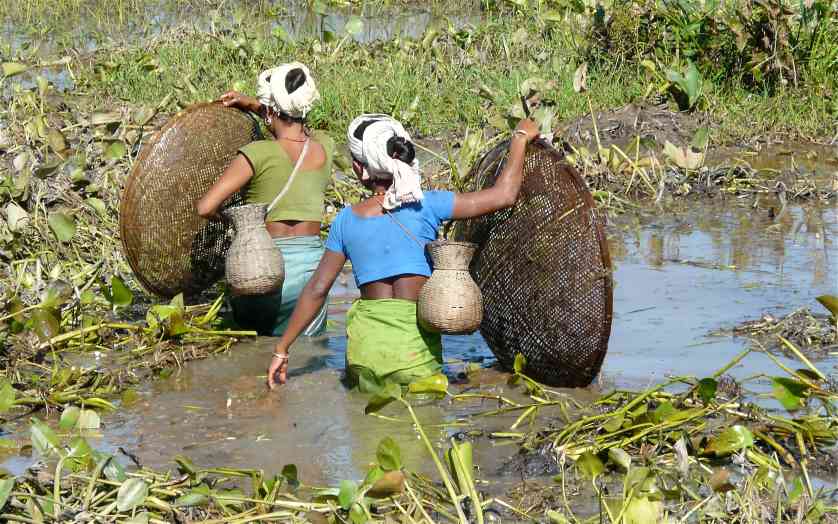
On the socio-economic front, the sector while presenting opportunities for economic growth and food security, has long been male-dominated, leaving women with limited access to ownership and decision-making roles. In the year 2019 – 2020, the fishing community’s population in Assam stood at around 25,24,106 out of which 36 per cent are female and 64 per cent are male.
Societal and economic preconditions have contributed to women’s marginalised position, perpetuating traditional gender norms and hindering their potential contributions. Furthermore, the patriarchal structure of land ownership and market dynamics acts as a significant barrier to women’s participation in the sector.
The power of collective action
In the leading fish-producing Morigaon district of Assam, a development organisation, ICCo, recognised the need for structural inclusion and empowerment of women in freshwater aquaculture. The journey began with persistent efforts to collectivise women fish farmers, facilitating them to form a platform to come together and harness their collective strength. After years of dedication, the cooperative society named Champavati Meen Palan Samabai Samiti was established in 2020, comprising an impressive 2000 women fish farmers.
With the formation of the cooperative society, the women embarked on a journey of commercial fish farming, harnessing their skills, knowledge, and determination to make a significant impact. Through this initiative, they gained access to resources, training, and support that have allowed them to flourish as successful fish farmers. The training was provided on a wide array of subjects relating to pond construction, pond management, fish diseases management, enhancement of natural aquatic productivity, feed formulation, and growth.
Since November 2022, ICCo’s sister organisation, ICCSPL, with support from the German agency GIZ, launched a gender-sensitive program to promote environmentally responsible aquaculture practices in the cooperative society. Initially starting with a pilot with 500 fish farmers, the program facilitated the transition of the women fish farmers from conventional practices to natural farming.
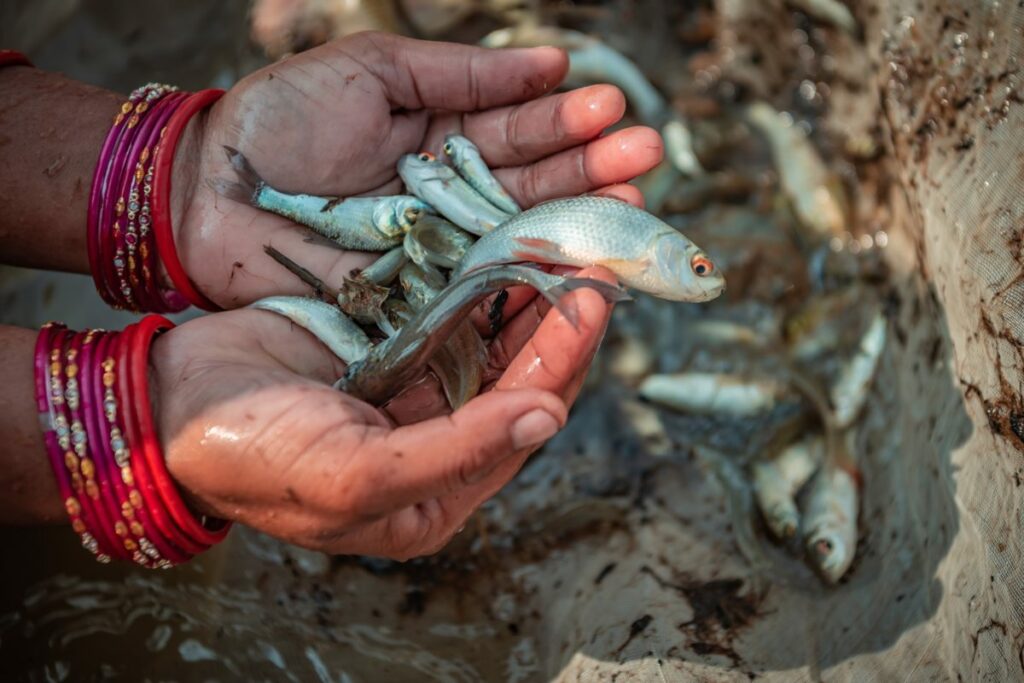
Through gender-inclusive policies, training programs, and capacity-building initiatives, women were trained to adopt natural methods of fish farming. This shift not only benefits the environment but also enhances the quality of fish produced which brings in a higher price at the market. However, it is notable to mention that the concerns of the women in the collective extended beyond their immediate economic interests. They demonstrated a deep consciousness of the environmental impacts of conventional aquaculture practices and a strong commitment to safeguarding the well-being of future generations.
At the core of their transition lies a trust-based Peer Monitoring Tool, which the women have embraced to ensure adherence to natural fish farming practices among all the members. This collective commitment has set them on a path to qualify for the Participatory Guarantee Scheme (PGS) enabling them to obtain organic certification at no cost. Such an achievement is remarkable, considering the typically high expenses associated with organic certification, and highlights the efficacy of collective action in driving positive change. Their success in embracing sustainable practices has sparked advocacy for the incorporation of the PGS into freshwater aquaculture practices nationwide. Efforts are also underway to encourage local entrepreneurs their increased participation in fishery-related entrepreneurial activities.
Nirmali, President of the cooperative society, says to FII, ‘It’s the first time that we (women folk) are actively involved in the entire production chain and we can see that society has also started giving us the due respect,’ – her determination and perseverance signify a powerful force driving positive change in the aquaculture sector and beyond.
Challenges and complexities
The path towards success for the women of the collective was far from easy, as they confronted deep-rooted patriarchal gender norms. Convincing their husbands, fathers, or male family members to support their involvement in fish farming required significant effort considering women seldom are landowners. Initial resistance was met with men attending the training sessions alongside the women, aiming to maintain their authority and control over the decision-making processes. As the women took charge and became more actively involved, they likely gained confidence and proved their competence in managing the business.
However, one significant challenge that might remain is the issue of financial control and ownership. Even if the women are actively engaged in business and contributing to the income, traditional gender norms might still dictate that the husband or male head of the family should be in charge of managing and controlling the finance.
Another roadblock would be the complex interplay between gender and caste, as upper-caste women often hesitate to undertake tasks associated with lower-caste identities. A notable example is their reluctance to directly sell fish in the market despite being fish farmers as selling fish is commonly associated with scheduled caste populations in the region.
As Neena* mentions to FII, ‘gao r raij e mur hathor nakhabo jodi moi jukhor palla loi maas bikri koru,’ meaning the village elders will refuse to eat food served by me if I hold the measuring scale and start selling fish in the market. Her remark exemplifies the deeply entrenched nature of the caste, which continues to permeate various aspects of society and contribute to intersecting forms of oppression.
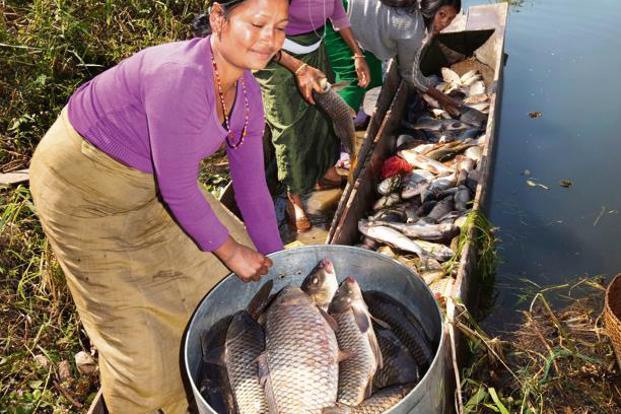
In the case of Neena, her reluctance to directly sell fish in the market reflects the fear of facing societal ostracism. The intersectionality of gender and caste dynamics compounds the challenges faced by women like Neena. Not only do they have to confront gender-based discrimination, but they also encounter barriers arising from their caste identity. The situation is even more daunting for lower-caste women as they experience systemic disadvantages from the intersection of caste and gender.
The collective effort of women in Assam’s aquaculture sector exemplifies the power of gender-inclusive approaches in combating environmental degradation and promoting sustainability. By empowering women and challenging traditional norms, they have paved the way for a more environmentally responsible and socially equitable industry. As society recognises and addresses intersecting forms of oppression, it can foster a more inclusive and sustainable future for aquaculture in Assam and beyond.
Note: * name changed
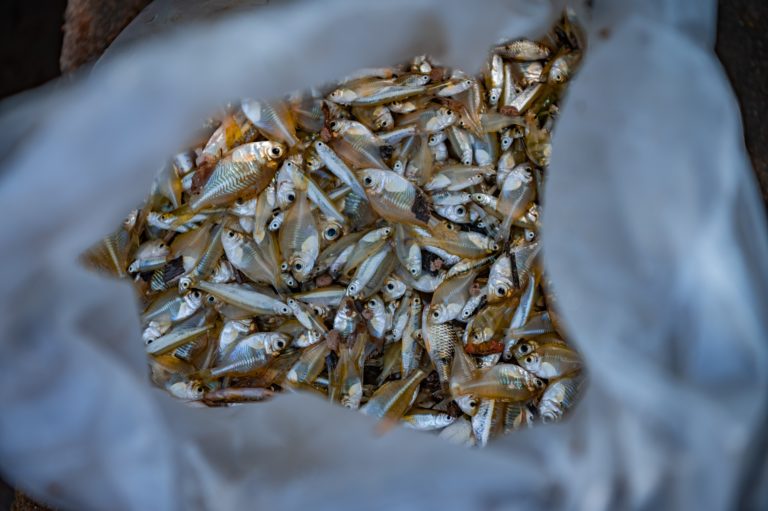
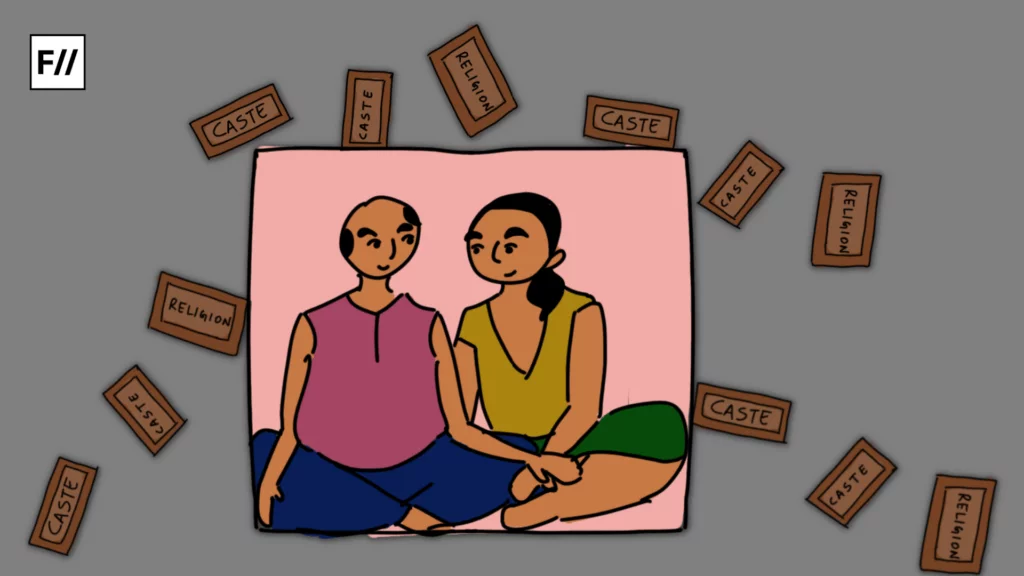



Comments:
Comments are closed.